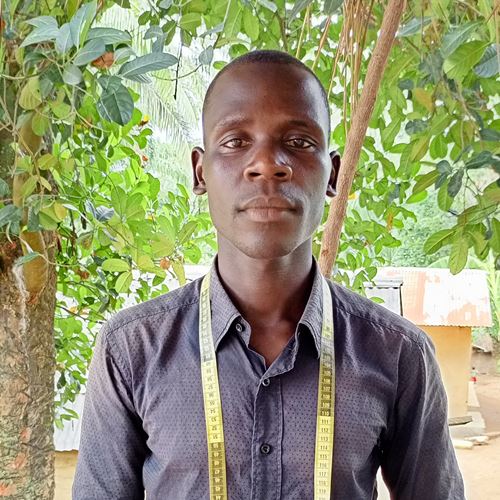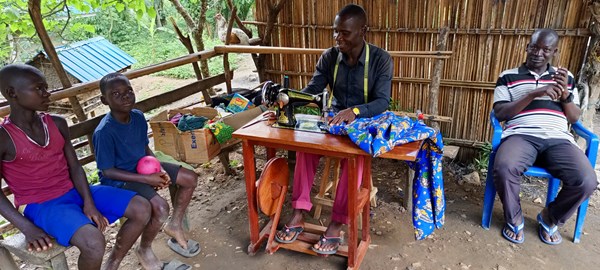Enabling Affected Communities to Survive and Thrive (EAST)
The populations of the Eastern provinces of the Democratic Republic of Congo have been subjected to a decades-long humanitarian crisis, in large part driven by the involvement of over 130 armed groups vying for political and territorial control.

The protracted crisis involves not only local and national armed actors, but has drawn in the participation of foreign militaries, exacerbating community tensions and the loss of homes and livelihoods, increasing the risk of protection incidents including cases of Gender Based Violence, and overwhelming social infrastructure.
This 30-year crisis is also taking place within a context of poor infrastructure development and regular climatic disasters. Driven by the violence and the lack of economic opportunities, the population often moves to the shores of the lakes, which are often calmer areas and more conducive to the development of economic activities.
However, overpopulation and the resulting deforestation in these areas increase the risk of erosion and the impact of the rising waters inherent to each rainy season, reinforcing new dynamics of vulnerability and population displacement.
To respond to the multiple vulnerabilities and needs exacerbated by this multi-causal crisis, the EAST consortium, with financial support from the Foreign, Commonwealth & Development Office (FCDO), has implemented a project to strengthen the food, economic and nutritional security of households affected by conflict and long-term displacement, and to ensure that vulnerable households are protected and can access humanitarian aid.
Long-term displaced by the rising waters of Lake Albert, Warom shares today how he has been assisted by the project.
The interview took place in one of the localities where the FCDO project has supported several households through income-generating activities (IGAs), vocational training, the establishment of agricultural groups and the creation of village savings and loan associations.

My name is Warom, I am 33 years old and I am the father of two children. I live in the village of Labupamoth, one of the villages located in the Lanyi health area, Angumu health zone, in the Mahagi territory.
In my spare time, I like to continue learning by watching videos related to sewing. This allows me to improve my skills and further perfect my craft.
My family and I have been living here since 2021. We fled our home village due to the rising waters of Lake Albert, which began flooding in 2020 and continues to this day. We come from Kwero, one of the fishing camps located on the shores of the lake.
Our homes were completely flooded by the lake, forcing us to leave our village and seek refuge elsewhere. That is how we ended up here, where we have been able to rebuild our lives, despite the many difficulties we have encountered.
At first, adapting was not easy. We had a lot of difficulty getting used to this new environment and a culture that was very different from our own. We had to gradually familiarise ourselves with local customs and, over time, we began to feel that we were integrating. One of the biggest challenges was access to land.
It was difficult for us to obtain even a small field to cultivate. However, with patience and continuous effort, we gradually managed to find our place within the host community.
The assistance I received from DRC was crucial to my family and me. We were selected on the basis of vulnerability criteria, which enabled me to benefit from vocational training in cutting and sewing. This training, which lasted six months, was certified by a certificate of participation issued by the Social Affairs Division (DIVAS).
At the end of the training, I received a complete kit containing all the equipment and tools necessary for my socio-professional reintegration: a sewing machine with a foot pedal, a tape measure, scissors, a coal iron, fabrics and sewing threads.
In addition to this, we were given a cash balance to complete the purchase of the kit. The total value of the kit was estimated at USD 160.
During the training, we also received three monthly cash assistance payments to support consumption, each worth USD 20, to help meet our households' food needs during this learning period.
Today, I have been able to open my own sewing workshop in the town of Labupamoth. I am happy to see that I have a loyal and regular clientele. This gives me a real opportunity to develop my business and look to the future with more hope.
Apart from my two children, I travelled with two other people for whom I was responsible. When we arrived in this area, these people went through some very difficult times, as I unfortunately had to take them out of school due to our extremely limited resources at the time.
Today, thanks to the assistance of DRC and the training I received in cutting and sewing, these children have been able to return to school. Their access to healthcare is now guaranteed, which is a great relief to me.
This profession has provided me with a stable source of income that directly contributes to improving our quality of life and ensuring a better future for my entire family.
I would like to make a sincere appeal for such initiatives to be multiplied in order to help more people overcome the challenges they face.
Considering the many human disasters that continue to devastate so many families, these actions represent an essential lever for eradicating poverty and strengthening the resilience of our communities.